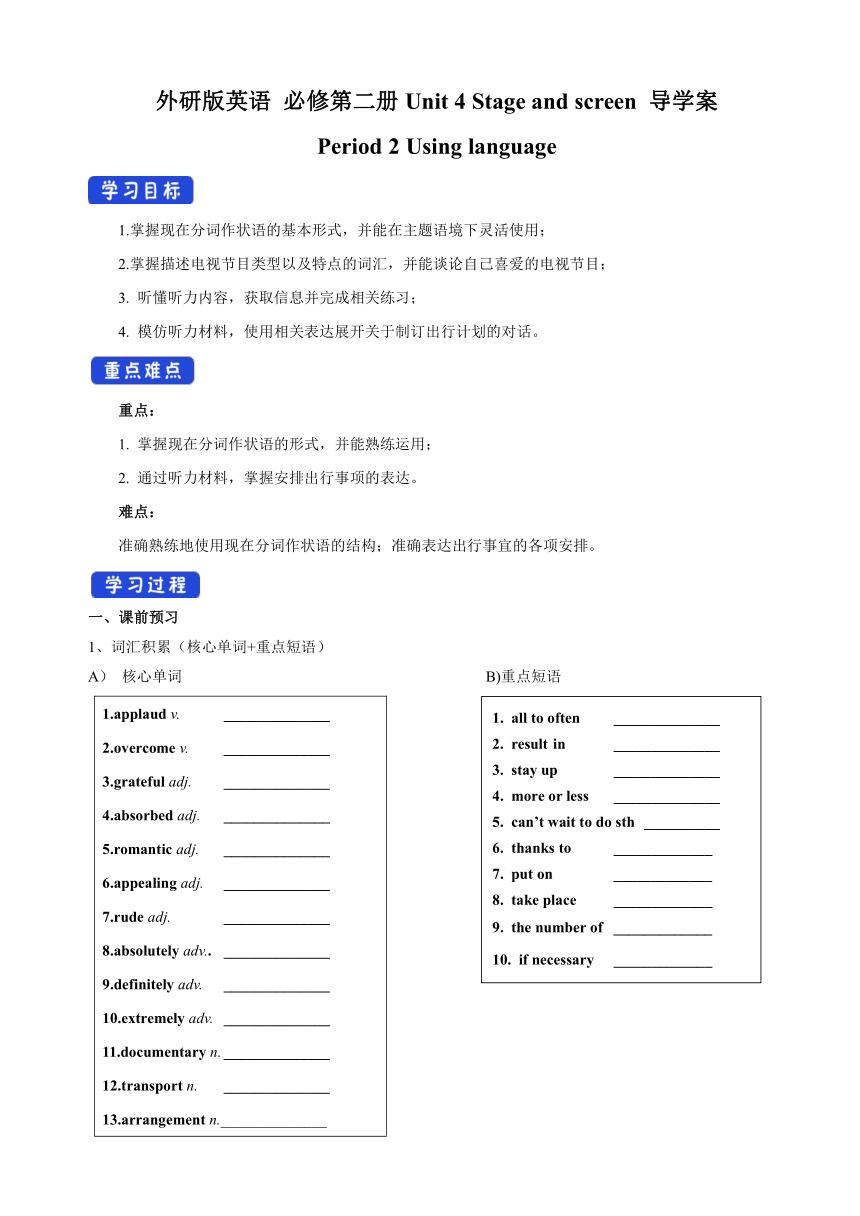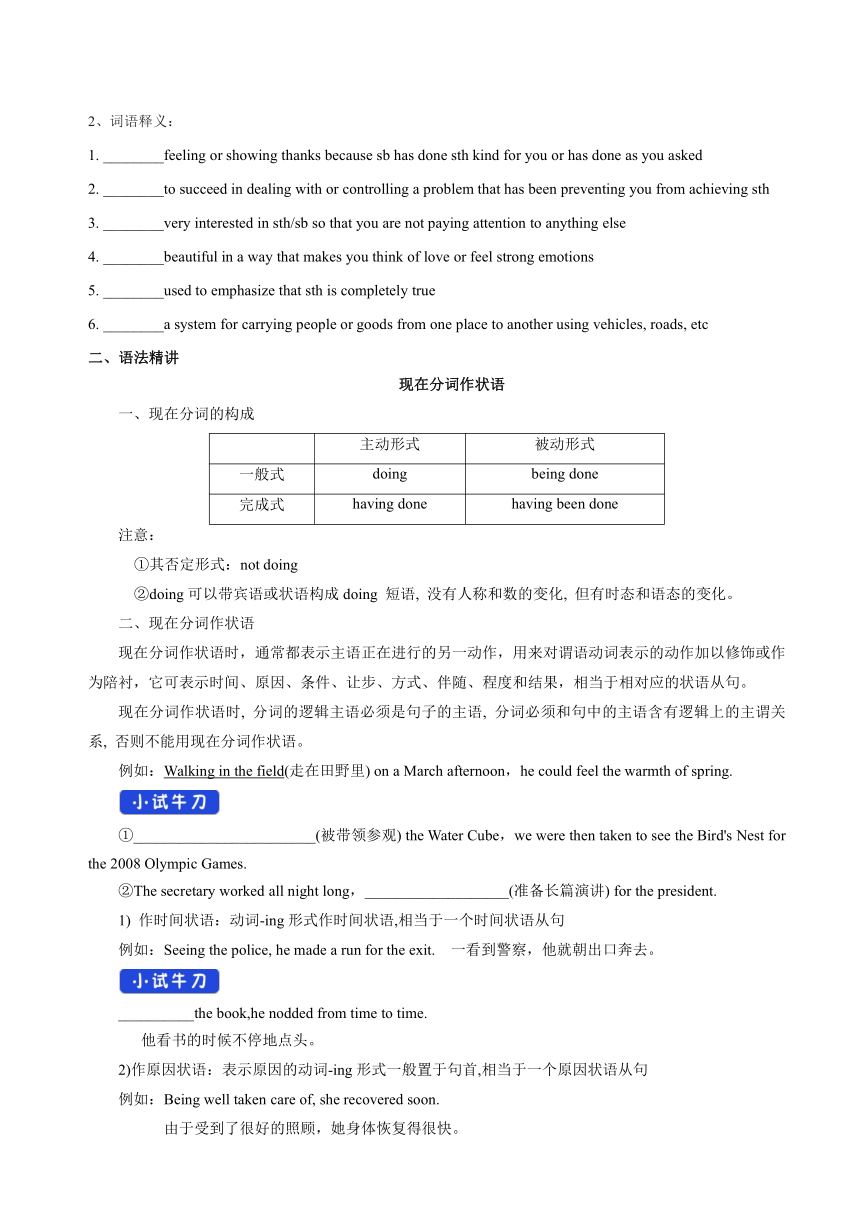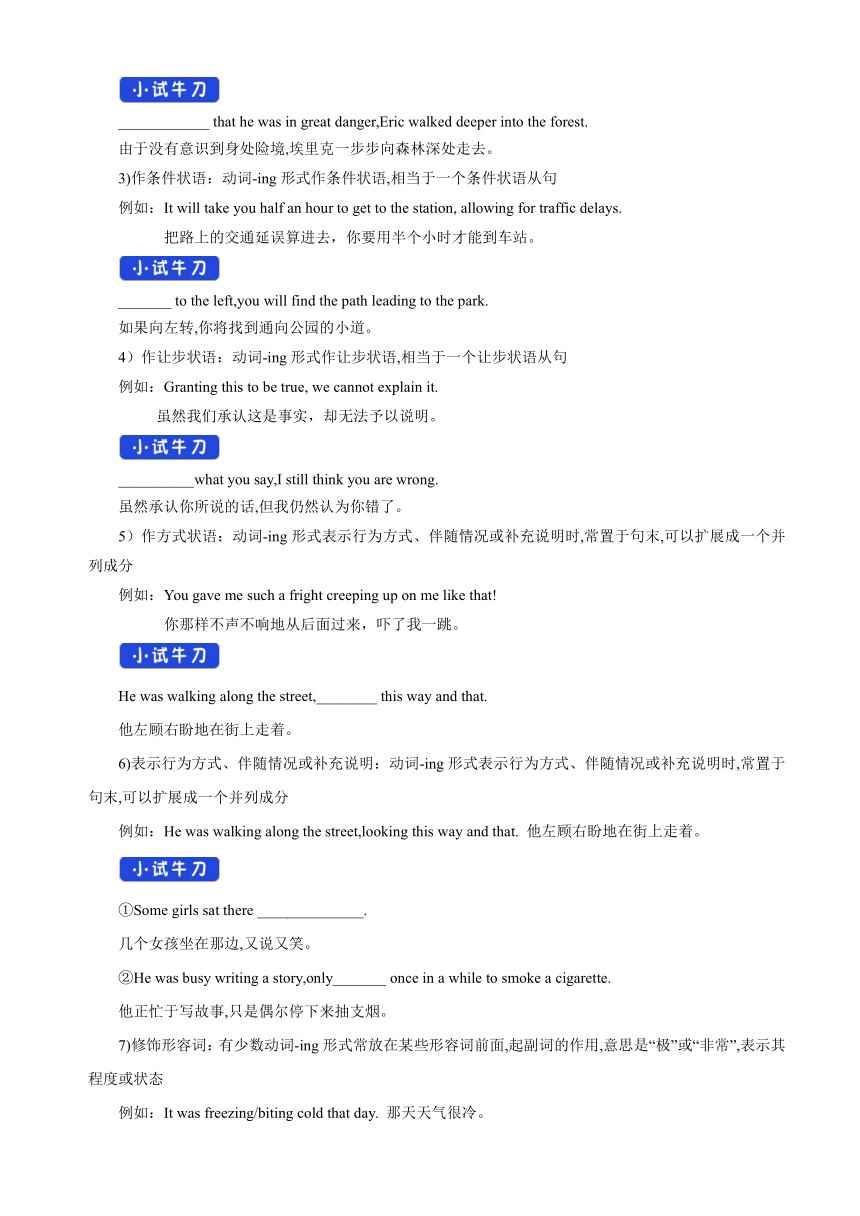外研版(2019)必修第二册 Unit4 Stage and screen Using languages 导学案(1)
文档属性
| 名称 | 外研版(2019)必修第二册 Unit4 Stage and screen Using languages 导学案(1) |  | |
| 格式 | zip | ||
| 文件大小 | 65.6KB | ||
| 资源类型 | 教案 | ||
| 版本资源 | 外研版(2019) | ||
| 科目 | 英语 | ||
| 更新时间 | 2022-08-21 16:29:32 | ||
图片预览



文档简介
外研版英语 必修第二册Unit 4 Stage and screen 导学案
Period 2 Using language
1.掌握现在分词作状语的基本形式,并能在主题语境下灵活使用;
2.掌握描述电视节目类型以及特点的词汇,并能谈论自己喜爱的电视节目;
3. 听懂听力内容,获取信息并完成相关练习;
4. 模仿听力材料,使用相关表达展开关于制订出行计划的对话。
重点:
1. 掌握现在分词作状语的形式,并能熟练运用;
2. 通过听力材料,掌握安排出行事项的表达。
难点:
准确熟练地使用现在分词作状语的结构;准确表达出行事宜的各项安排。
一、课前预习
词汇积累(核心单词+重点短语)
核心单词 B)重点短语
1.applaud v. ______________ 2.overcome v. ______________ 3.grateful adj. ______________ 4.absorbed adj. ______________ 5.romantic adj. ______________ 6.appealing adj. ______________ 7.rude adj. ______________ 8.absolutely adv.. ______________ 9.definitely adv. ______________ 10.extremely adv. ______________ 11.documentary n. ______________ 12.transport n. ______________ 13.arrangement n.______________
2、词语释义:
1. ________feeling or showing thanks because sb has done sth kind for you or has done as you asked
2. ________to succeed in dealing with or controlling a problem that has been preventing you from achieving sth
3. ________very interested in sth/sb so that you are not paying attention to anything else
4. ________beautiful in a way that makes you think of love or feel strong emotions
5. ________used to emphasize that sth is completely true
6. ________a system for carrying people or goods from one place to another using vehicles, roads, etc
二、语法精讲
现在分词作状语
一、现在分词的构成
主动形式 被动形式
一般式 doing being done
完成式 having done having been done
注意:
①其否定形式:not doing
②doing可以带宾语或状语构成doing 短语, 没有人称和数的变化, 但有时态和语态的变化。
二、现在分词作状语
现在分词作状语时,通常都表示主语正在进行的另一动作,用来对谓语动词表示的动作加以修饰或作为陪衬,它可表示时间、原因、条件、让步、方式、伴随、程度和结果,相当于相对应的状语从句。
现在分词作状语时, 分词的逻辑主语必须是句子的主语, 分词必须和句中的主语含有逻辑上的主谓关系, 否则不能用现在分词作状语。
例如:Walking in the field(走在田野里) on a March afternoon,he could feel the warmth of spring.
①________________________(被带领参观) the Water Cube,we were then taken to see the Bird's Nest for the 2008 Olympic Games.
②The secretary worked all night long,___________________(准备长篇演讲) for the president.
作时间状语:动词-ing形式作时间状语,相当于一个时间状语从句
例如:Seeing the police, he made a run for the exit. 一看到警察,他就朝出口奔去。
__________the book,he nodded from time to time.
他看书的时候不停地点头。
2)作原因状语:表示原因的动词-ing形式一般置于句首,相当于一个原因状语从句
例如:Being well taken care of, she recovered soon.
由于受到了很好的照顾,她身体恢复得很快。
____________ that he was in great danger,Eric walked deeper into the forest.
由于没有意识到身处险境,埃里克一步步向森林深处走去。
3)作条件状语:动词-ing形式作条件状语,相当于一个条件状语从句
例如:It will take you half an hour to get to the station, allowing for traffic delays.
把路上的交通延误算进去,你要用半个小时才能到车站。
_______ to the left,you will find the path leading to the park.
如果向左转,你将找到通向公园的小道。
4)作让步状语:动词-ing形式作让步状语,相当于一个让步状语从句
例如:Granting this to be true, we cannot explain it.
虽然我们承认这是事实,却无法予以说明。
__________what you say,I still think you are wrong.
虽然承认你所说的话,但我仍然认为你错了。
5)作方式状语:动词-ing形式表示行为方式、伴随情况或补充说明时,常置于句末,可以扩展成一个并列成分
例如:You gave me such a fright creeping up on me like that!
你那样不声不响地从后面过来,吓了我一跳。
He was walking along the street,________ this way and that.
他左顾右盼地在街上走着。
6)表示行为方式、伴随情况或补充说明:动词-ing形式表示行为方式、伴随情况或补充说明时,常置于句末,可以扩展成一个并列成分
例如:He was walking along the street,looking this way and that. 他左顾右盼地在街上走着。
①Some girls sat there ______________.
几个女孩坐在那边,又说又笑。
②He was busy writing a story,only_______ once in a while to smoke a cigarette.
他正忙于写故事,只是偶尔停下来抽支烟。
7)修饰形容词:有少数动词-ing形式常放在某些形容词前面,起副词的作用,意思是“极”或“非常”,表示其程度或状态
例如:It was freezing/biting cold that day. 那天天气很冷。
The weather has been__________ hot this week.
这个星期天气极热。
8)动词-ing形式作插入语:动词-ing形式可在句中作独立成分,表明说话人的态度
例如:Properly speaking,a whale is not a fish.
正确地说,鲸并非鱼类。
①___________,Chinese prefer tea to coffee.
一般说来,中国人爱喝茶胜过喝咖啡。
②___________this fact,he must be an honest man.
从这一事实判断,他必是一个诚实的人。
完成句子
1.由于没有收到他的信,我给他打了电话。
_____________any letter from him,I gave him a call.
2.跟着几个学生,老师进了教室。
_____________,the teacher enter the room.
3.从山顶上看,我可以看到那个公园。
_____________the top of the hill,I can see as far as the park.
4.听到那个消息,我高兴地跳了起来。
_____________,I jumped with joy.
5.以前去过那里,他对那里很熟悉。
_____________there before,he is familiar with it.
Ⅰ.根据汉语或首字母提示,写出下列单词。
1.We are _______(感激的) to you for your kind offer.
2.It was an ________ (极其,极度)difficult and dangerous task.
3.All the students that study hard can _______ (确切地,肯定地)pass the exam.
4.We were all told that Spain is a r_________ (浪漫的)nation.
5.I consider it _________ (完全地,绝对地)necessary.
6.We can and must o_________ our shortcomings.
7.This a_________ is agreeable to both sides.
8.Don't be so r_______ to your parents!
9.This world is always so interesting and a________.
10.Will was so a________ in reading that he went without his dinner.
Ⅱ.单句语法填空
1.The police are sparing no effort to search for the missing old man,_______(give) his children a ray of hope.
2.He came_______ (dash) into the room with some film tickets in his hand.
3._______(spend) all his money, the young man had to give his mother a call.
4.The plane crash happened,_______(kill) 163 people on board.
5.While _______(cross) the street, we must be very careful.
6._______(work) harder at lessons, you’ll make greater progress.
7.The fire lasted more than ten hours, _______(leave) nothing valuable.
8._______(judge) from his accent, he must be from Sichuan.
9._______(select) the proper present, they sent it to their respectable professor.
10.He was caught in the heavy rain, thus _______ (make) himself catch a cold.
Ⅲ.用动词的 ing形式改写下列句子
1.A few people entered the room and looked around in a curious way.
A few people entered the room ______________ in a curious way.
2.He comes home late every evening,and it makes his parents very angry.
He comes home late every evening,_______________________.
3.As you are a teacher,you should help your students in the best way.
______________,you should help your students in the best way.
4.When he was crossing the street,the old man was knocked over by a car.
______________,the old man was knocked over by a car.
5.Because he had lived with the girl for 5 years,he knows her very well.
_____________________,he knows her very well.
参考答案:
一、课前预习
1、生词+短语
A) 略
B) 略
2、词语释义:1.grateful; 2.overcome; 3.absorbed; 4.romantic; 5.absolutely; 6.transport
二、语法精讲
现在分词作状语:①Having been shown around; ②preparing a long speech
1)While reading
2)Not realizing
3)Turning
4)Admitting
5)looking
6)①laughing and chatting; ②stopping
7)burning/steaming
8)①Generally speaking; ②Judging from
自我检测
1、Not receiving
2、Following several students
3、Seeing from
4、Hearing the news
5、Having been
课后巩固
Ⅰ、1. grateful; 2.extremely; 3.definitely; 4.romantic; 5.absolutely;
6. overcome; 7.arrangement; 8.rude; 9.appealing; 10.absorbed
Ⅱ、1.giving; 2.dashing; 3.Having spent; 4.killing; 5.crossing;
6.Working; 7. leaving; 8.Judging; 9.Having selected; 10.making
Ⅲ、1.looking around;
2.making his parents very angry;
3.Being a teacher;
4.Crossing the street;
5.Having lived with the girl for 5 years
Period 2 Using language
1.掌握现在分词作状语的基本形式,并能在主题语境下灵活使用;
2.掌握描述电视节目类型以及特点的词汇,并能谈论自己喜爱的电视节目;
3. 听懂听力内容,获取信息并完成相关练习;
4. 模仿听力材料,使用相关表达展开关于制订出行计划的对话。
重点:
1. 掌握现在分词作状语的形式,并能熟练运用;
2. 通过听力材料,掌握安排出行事项的表达。
难点:
准确熟练地使用现在分词作状语的结构;准确表达出行事宜的各项安排。
一、课前预习
词汇积累(核心单词+重点短语)
核心单词 B)重点短语
1.applaud v. ______________ 2.overcome v. ______________ 3.grateful adj. ______________ 4.absorbed adj. ______________ 5.romantic adj. ______________ 6.appealing adj. ______________ 7.rude adj. ______________ 8.absolutely adv.. ______________ 9.definitely adv. ______________ 10.extremely adv. ______________ 11.documentary n. ______________ 12.transport n. ______________ 13.arrangement n.______________
2、词语释义:
1. ________feeling or showing thanks because sb has done sth kind for you or has done as you asked
2. ________to succeed in dealing with or controlling a problem that has been preventing you from achieving sth
3. ________very interested in sth/sb so that you are not paying attention to anything else
4. ________beautiful in a way that makes you think of love or feel strong emotions
5. ________used to emphasize that sth is completely true
6. ________a system for carrying people or goods from one place to another using vehicles, roads, etc
二、语法精讲
现在分词作状语
一、现在分词的构成
主动形式 被动形式
一般式 doing being done
完成式 having done having been done
注意:
①其否定形式:not doing
②doing可以带宾语或状语构成doing 短语, 没有人称和数的变化, 但有时态和语态的变化。
二、现在分词作状语
现在分词作状语时,通常都表示主语正在进行的另一动作,用来对谓语动词表示的动作加以修饰或作为陪衬,它可表示时间、原因、条件、让步、方式、伴随、程度和结果,相当于相对应的状语从句。
现在分词作状语时, 分词的逻辑主语必须是句子的主语, 分词必须和句中的主语含有逻辑上的主谓关系, 否则不能用现在分词作状语。
例如:Walking in the field(走在田野里) on a March afternoon,he could feel the warmth of spring.
①________________________(被带领参观) the Water Cube,we were then taken to see the Bird's Nest for the 2008 Olympic Games.
②The secretary worked all night long,___________________(准备长篇演讲) for the president.
作时间状语:动词-ing形式作时间状语,相当于一个时间状语从句
例如:Seeing the police, he made a run for the exit. 一看到警察,他就朝出口奔去。
__________the book,he nodded from time to time.
他看书的时候不停地点头。
2)作原因状语:表示原因的动词-ing形式一般置于句首,相当于一个原因状语从句
例如:Being well taken care of, she recovered soon.
由于受到了很好的照顾,她身体恢复得很快。
____________ that he was in great danger,Eric walked deeper into the forest.
由于没有意识到身处险境,埃里克一步步向森林深处走去。
3)作条件状语:动词-ing形式作条件状语,相当于一个条件状语从句
例如:It will take you half an hour to get to the station, allowing for traffic delays.
把路上的交通延误算进去,你要用半个小时才能到车站。
_______ to the left,you will find the path leading to the park.
如果向左转,你将找到通向公园的小道。
4)作让步状语:动词-ing形式作让步状语,相当于一个让步状语从句
例如:Granting this to be true, we cannot explain it.
虽然我们承认这是事实,却无法予以说明。
__________what you say,I still think you are wrong.
虽然承认你所说的话,但我仍然认为你错了。
5)作方式状语:动词-ing形式表示行为方式、伴随情况或补充说明时,常置于句末,可以扩展成一个并列成分
例如:You gave me such a fright creeping up on me like that!
你那样不声不响地从后面过来,吓了我一跳。
He was walking along the street,________ this way and that.
他左顾右盼地在街上走着。
6)表示行为方式、伴随情况或补充说明:动词-ing形式表示行为方式、伴随情况或补充说明时,常置于句末,可以扩展成一个并列成分
例如:He was walking along the street,looking this way and that. 他左顾右盼地在街上走着。
①Some girls sat there ______________.
几个女孩坐在那边,又说又笑。
②He was busy writing a story,only_______ once in a while to smoke a cigarette.
他正忙于写故事,只是偶尔停下来抽支烟。
7)修饰形容词:有少数动词-ing形式常放在某些形容词前面,起副词的作用,意思是“极”或“非常”,表示其程度或状态
例如:It was freezing/biting cold that day. 那天天气很冷。
The weather has been__________ hot this week.
这个星期天气极热。
8)动词-ing形式作插入语:动词-ing形式可在句中作独立成分,表明说话人的态度
例如:Properly speaking,a whale is not a fish.
正确地说,鲸并非鱼类。
①___________,Chinese prefer tea to coffee.
一般说来,中国人爱喝茶胜过喝咖啡。
②___________this fact,he must be an honest man.
从这一事实判断,他必是一个诚实的人。
完成句子
1.由于没有收到他的信,我给他打了电话。
_____________any letter from him,I gave him a call.
2.跟着几个学生,老师进了教室。
_____________,the teacher enter the room.
3.从山顶上看,我可以看到那个公园。
_____________the top of the hill,I can see as far as the park.
4.听到那个消息,我高兴地跳了起来。
_____________,I jumped with joy.
5.以前去过那里,他对那里很熟悉。
_____________there before,he is familiar with it.
Ⅰ.根据汉语或首字母提示,写出下列单词。
1.We are _______(感激的) to you for your kind offer.
2.It was an ________ (极其,极度)difficult and dangerous task.
3.All the students that study hard can _______ (确切地,肯定地)pass the exam.
4.We were all told that Spain is a r_________ (浪漫的)nation.
5.I consider it _________ (完全地,绝对地)necessary.
6.We can and must o_________ our shortcomings.
7.This a_________ is agreeable to both sides.
8.Don't be so r_______ to your parents!
9.This world is always so interesting and a________.
10.Will was so a________ in reading that he went without his dinner.
Ⅱ.单句语法填空
1.The police are sparing no effort to search for the missing old man,_______(give) his children a ray of hope.
2.He came_______ (dash) into the room with some film tickets in his hand.
3._______(spend) all his money, the young man had to give his mother a call.
4.The plane crash happened,_______(kill) 163 people on board.
5.While _______(cross) the street, we must be very careful.
6._______(work) harder at lessons, you’ll make greater progress.
7.The fire lasted more than ten hours, _______(leave) nothing valuable.
8._______(judge) from his accent, he must be from Sichuan.
9._______(select) the proper present, they sent it to their respectable professor.
10.He was caught in the heavy rain, thus _______ (make) himself catch a cold.
Ⅲ.用动词的 ing形式改写下列句子
1.A few people entered the room and looked around in a curious way.
A few people entered the room ______________ in a curious way.
2.He comes home late every evening,and it makes his parents very angry.
He comes home late every evening,_______________________.
3.As you are a teacher,you should help your students in the best way.
______________,you should help your students in the best way.
4.When he was crossing the street,the old man was knocked over by a car.
______________,the old man was knocked over by a car.
5.Because he had lived with the girl for 5 years,he knows her very well.
_____________________,he knows her very well.
参考答案:
一、课前预习
1、生词+短语
A) 略
B) 略
2、词语释义:1.grateful; 2.overcome; 3.absorbed; 4.romantic; 5.absolutely; 6.transport
二、语法精讲
现在分词作状语:①Having been shown around; ②preparing a long speech
1)While reading
2)Not realizing
3)Turning
4)Admitting
5)looking
6)①laughing and chatting; ②stopping
7)burning/steaming
8)①Generally speaking; ②Judging from
自我检测
1、Not receiving
2、Following several students
3、Seeing from
4、Hearing the news
5、Having been
课后巩固
Ⅰ、1. grateful; 2.extremely; 3.definitely; 4.romantic; 5.absolutely;
6. overcome; 7.arrangement; 8.rude; 9.appealing; 10.absorbed
Ⅱ、1.giving; 2.dashing; 3.Having spent; 4.killing; 5.crossing;
6.Working; 7. leaving; 8.Judging; 9.Having selected; 10.making
Ⅲ、1.looking around;
2.making his parents very angry;
3.Being a teacher;
4.Crossing the street;
5.Having lived with the girl for 5 years
